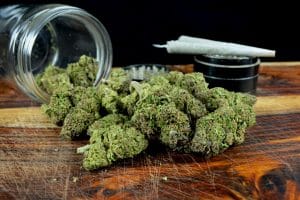Some in Congress Wants to Decriminalize Marijuana. It’s a Start.
 Smoking pot has been an activity enjoyed among a growing number of people for decades. Now that it has been largely determined that its effects are safer than drinking alcohol, why should anyone face prison time and consequences of an arrest just for doing something that is being proven to have positive uses?
Smoking pot has been an activity enjoyed among a growing number of people for decades. Now that it has been largely determined that its effects are safer than drinking alcohol, why should anyone face prison time and consequences of an arrest just for doing something that is being proven to have positive uses?
Research is showing that marijuana is less addictive than alcohol use and half of the United States Congress appears to be jumping on the bandwagon to decriminalize its use. If Congress sees this as a need, maybe the bulk of arrests for the possession of marijuana will be a thing of the past in the not-so-distant future. Law enforcement would probably start doing a dance down the street.
What is the MORE Act?
As if this year couldn’t get any more shocking; yes, it’s true. The House voted to decriminalize marijuana use and possession on December 4, 2020. The Marijuana Opportunity Reinvestment and Expungement (MORE) Act is designed to clear up some of the muck that marijuana regulation has created in our justice system.
Before you stop reading and begin jumping for joy, this does not mean you are free to run to your nearest dealer to stock up for the apocalypse. Unless the Senate were to follow in the House’s footsteps and the MORE Act gets signed into law, for now, it’s still illegal in certain instances.
That said, the aim of the bill is not only to decriminalize general marijuana use, but also to expunge some marijuana convictions, and add a 5% tax on marijuana sales to fund programs for those with a true drug addiction.
As with everything controversial, passing this bill is going to be more about political strategy than whether anyone truly thinks marijuana is harmful, so stay tuned.
The difference between legalizing and decriminalizing
Often when people see the word “decriminalized” they confuse it with “legalized,” but they have very different meanings:
- Decriminalize just means that the activity is no longer something punishable as a criminal offense. In other words, you wouldn’t need to call me at 3 a.m. to attend your early morning bail hearing so you can make it to work without your employer finding out. You’d still face some sort of penalty but wouldn’t face jail time or be arrested.
- Legalize means you’re free to engage in the activity without any repercussions whatsoever provided your activities fall within whatever the law requires. If they legalize marijuana at some point but on the condition that you only smoke it in the privacy of your own home, you can’t pull out a doobie and light up while walking through the mall.
How much jail time can I get for possessing marijuana?
Medical marijuana users fall into a category all their own. Using cannabis in Maryland with a valid prescription for a qualifying medical reason is completely legal provided you purchase it at one of the licensed dispensaries. You’re within the legal limit if you possess up to 120 grams. Anything above that will likely place you into one of the categories below if you get caught. Dispensary owners are off the hook if they are properly licensed and following regulations.
That leaves four main categories of people when it comes to being concerned about marijuana and legal troubles:
- Recreational users
- Selling small quantities to friends
- Dealing to acquaintances and strangers
- Distributing to dealers
In Maryland, whether you’ll go to jail depends on how much pot you have in your possession. Anything less than 10 grams is a civil penalty, which means you’re not going to be arrested and risk jail time. You’ll just receive a $100 fine. After that, the stakes get a bit higher if you get caught, making it imperative that you call me before you dig yourself into a hole with the police that you can’t get out of, which starts with years in prison and thousands in fines.
If you’ve been arrested for a marijuana possession charge, don’t panic, and don’t talk – unless it’s to ask to make your phone call and then call me, Drew Cochran, Attorney at Law, as quickly as you can. The longer you stay in custody the more likely it is that you’re going to inadvertently help police build a case against you putting you at greater risk of losing everything.
To schedule your free consultation with me today in my Annapolis or Ellicott City offices, call 410.271.1892 or you or a member of your family can reach out to me through my firm’s contact page.
And remember – Keep Calm, and Call Drew.

Drew Cochran has practiced criminal defense law in Annapolis for more than 20 years. He is a member of the Maryland State Bar, Anne Arundel County Bar, and the Maryland Criminal Defense Attorneys’ Association. Named a “Leading Attorney” by What’s Up Magazine: Annapolis in 2011, he handles criminal defense, DUI defense, juvenile law, and all felony and misdemeanor defense throughout Maryland. Read Full Bio
